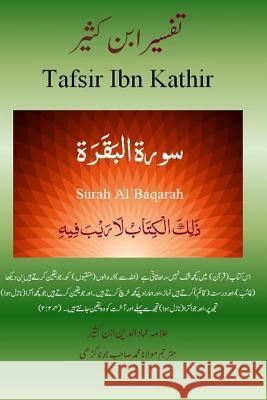Quran Tafsir Ibn Kathir (Urdu): Surah Al Baqarah » książka
Quran Tafsir Ibn Kathir (Urdu): Surah Al Baqarah
ISBN-13: 9781512021172 / Urdu / Miękka / 2015 / 612 str.
This is the longest Surah of the Quran. The name of the Surah is from the Parable of the Heifer in Ayah 67-71, which illustrates the insufficiency of carping obedience. When faith is lost, people put off obedience with various excuses; even when at last they obey in the letter, they fail in the spirit, which means that they get fossilized, and their self-sufficiency prevents them from seeing that spiritually they are not alive but dead. For life is movement, activity, striving, fighting against baser things. And this is the burden of the Surah. The Surah begins (1-29) by classifying men into three broad categories, depending on how they receive Allah's message. This leads to the story of the creation of man, the high destiny intended for him, his fall, and the hope held out to him (30-39). Israel's story is then told according to their own records and traditions-what privileges they received and how they abused them (40-86), thus illustrating again as by a parable the general story of man. In particular, reference is made to Moses and Jesus and their struggles with an unruly people: how people of the Book played false their own lights and in their pride rejected Muhammad, who came in the true line of Prophets (87-121). They falsely laid claim to the virtues of Father Abraham; he was indeed a righteous Imam, but he was the progenitor of Ismail's line (Arabs) as well as of Israel's line, and he with Ismail built the Ka'bah (the House of Allah in Makkah) and purified it, thus establishing a common religion, of which Islam is the universal exponent (122-141). The Ka'bah was now to be the center of universal worship and the symbol of Islamic unity (142-167). The Islamic Ummah (brotherhood) having thus been established with its definite centre and symbol, ordinances are laid down for the social life of the community, with the proviso that righteousness does not consist in formalities, but in faith, kindness, prayer, charity, probity, and patience under suffering. The ordinances relate to food and drink, bequests, fasts, jihad, wine and gambling, treatment of orphans and women, etc, (168-242). Lest the subject of jihad should be misunderstood, it is taken up again in the story of Saul, Goliath and David(243-253). And so the lesson is enforced that true virtues lies in practical deeds of manliness, kindness, and good faith (254-283), and Allah's nature is called to mind in the sublime Ayah al Kursi, the Verse of the Throne. The Surah ends with an exhortation to Faith, Obedience, a sense of Personal Responsibility, and Prayer. Abdullah Yusuf Ali
Zawartość książki może nie spełniać oczekiwań – reklamacje nie obejmują treści, która mogła nie być redakcyjnie ani merytorycznie opracowana.











